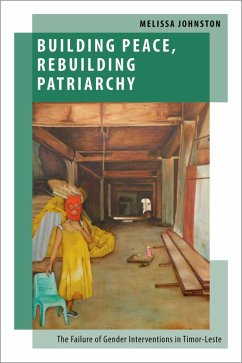Over the two decades since the adoption of United Nations Security Council Resolution 1325 on Women, Peace and Security, peacebuilding interventions around the globe have increasingly incorporated gender perspectives. These initiatives have used both development programs and gender mainstreaming to advance women's empowerment, with the aim of making peacebuilding more effective as well as building more stable societies and efficient economies. This goal has been manifested in a wide range of programs and projects-or "gender interventions"--including economic empowerment measures, gender quotas, gender-responsive budgeting, and legal reforms. Yet, the results have been uneven, provoking a sizable debate among scholars and practitioners seeking to explain the shortcomings and improve the outcomes. In
Building Peace, Rebuilding Patriarchy, Melissa Johnston explains why gender interventions often fail to help those who most need them, using the case of Timor-Leste, a country subjected to high levels of peacebuilding and gender interventions between 1999 and 2017. Looking at three types of gender interventions--gender-responsive budgeting, the law against domestic violence, and microfinance initiatives--Johnston argues that these reforms have produced mixed results because they reinscribe entrenched class and gender hierarchies in their implementation. Focusing on the connection between politics, economics, and gender, Johnston identifies the emergence of an elite class coalition, built on kinship and gender order in Timor-Leste as the root of the problem. Peacebuilders have made concessions to elites and violent men to keep the peace, a tendency amplified by "local turn" approaches to peacebuilding. As a result, deep inequalities remain and violence against women is endemic across the country. Compelling and insightful,
Building Peace, Rebuilding Patriarchy makes the case that as peacebuilders seek to rebuild war-torn societies, understanding the intersection of social and gender order is more important than ever.
Dieser Download kann aus rechtlichen Gründen nur mit Rechnungsadresse in A, B, BG, CY, CZ, D, DK, EW, E, FIN, F, GR, HR, H, IRL, I, LT, L, LR, M, NL, PL, P, R, S, SLO, SK ausgeliefert werden.









